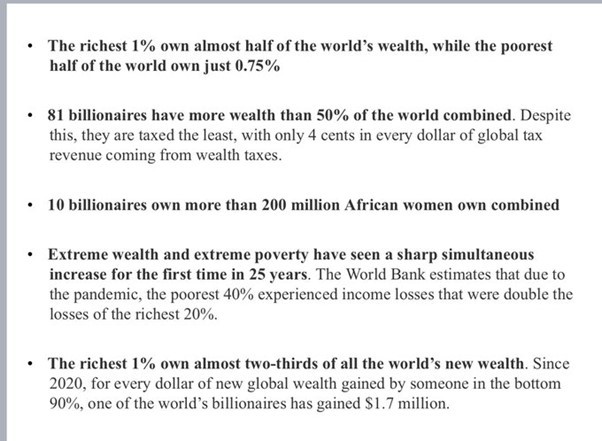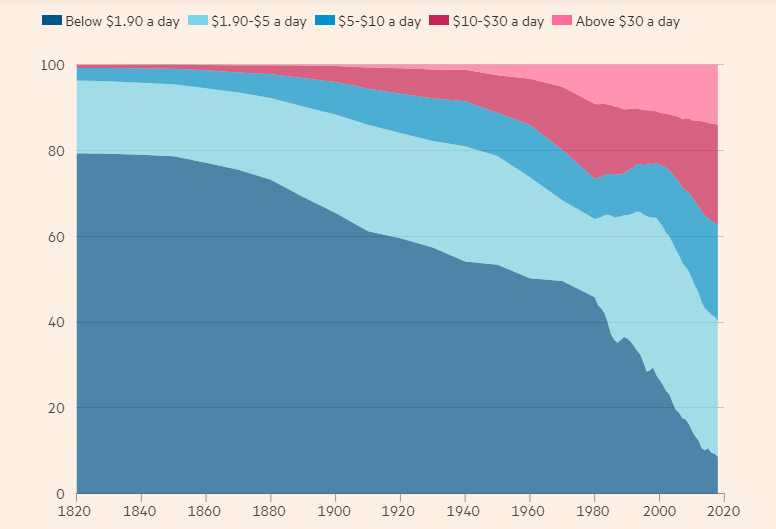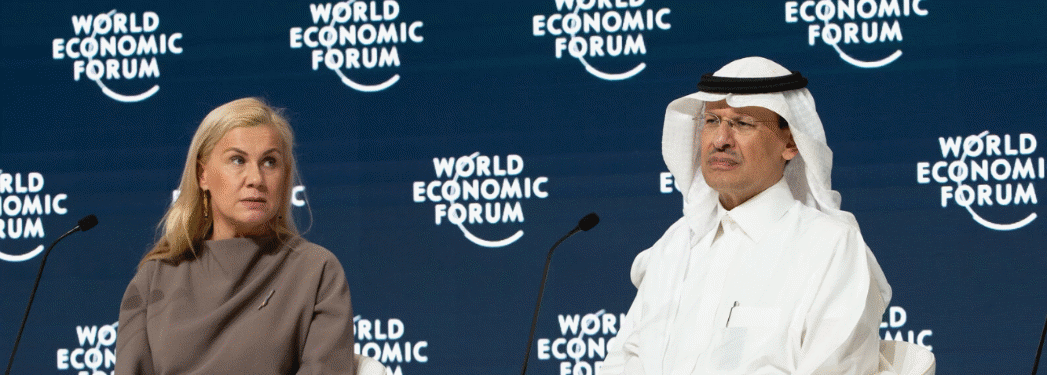By Michael Roberts
The great and the good have just finished attending a special World Economic Forum in Riyadh, Saudi Arabia. The theme of the conference for the over 1,000 delegates from corporations, governments and international agencies was global cooperation and inclusive growth. In other words, how to reverse the growing international trade wars and rising inequality of income and wealth with policies of cooperation and inclusive economic measures.
The irony of meeting in Saudi Arabia to discussing inclusivity
There was a certain irony about all these attendees discussing ‘inclusive’ economic policies in Saudi Arabia, infamous for its discrimination and exclusion of women, gays and exploitation of its immigrant population that does most of the labour in the country. Nevertheless, the leaders of the IMF and the World Bank were there in force to promote their new tack of a ‘compact for inclusive growth’. The aim is to ‘reverse’ what they think is only a recent trend towards greater inequality of income and wealth globally.

IMF leader, Kristalina Georgieva was there to press for policies that will boost global collaboration and reduce economic inequality – seemingly a switch by the IMF from competition, labour ‘flexibility’ and fiscal ‘prudence’ which have been the watchwords of IMF economic policy for decades.
Criticism of the scale and implications of inequality
It would seem that the IMF is a changed body. Recently it even promoted an article by Nobel prize winner, Angus Deaton, who has been exposing the growing inequalities of income and social mobility in his books and papers. In a piece, called Rethinking my economics, Deaton gave us his mea culpa on the changes in his own views.
Deaton reckoned that mainstream economics (and by implication the IMF, the World Bank and the World Economic Forum) “are in some disarray. We did not collectively predict the financial crisis and, worse still, we may have contributed to it through an overenthusiastic belief in the efficacy of markets, especially financial markets whose structure and implications we understood less well than we thought.” So ‘free markets’ are not as efficacious as claimed and crises cannot be avoided.
Deaton admitted that “I have recently found myself changing my mind, a discomfiting process for someone who has been a practising economist for more than half a century.” You see, the “emphasis on the virtues of free, competitive markets and exogenous technical change can distract us from the importance of power in setting prices and wages, in choosing the direction of technical change, and in influencing politics to change the rules of the game.”
Admission that social justice is subservient to market forces
So Deaton has had an epiphany. He now finds that it is the power of capital and its attempt to exploit labour that is the driving force in economies, not technical efficiency or ‘free and fair’ markets. Apparently, at some point in time, not defined by him, “social justice became subservient to markets, and a concern with distribution was overruled by attention to the average, often nonsensically described as the “national interest’.”
More specifically, Deaton criticized what mainstream economics concentrates on rather than on the issues of power and distribution of wealth: “the currently approved methods, randomized controlled trials, differences in differences, or regression discontinuity designs, have the effect of focusing attention on local effects, and away from potentially important but slow-acting mechanisms that operate with long and variable lags.” Indeed, Deaton is right about that. It’s something many outside the mainstream have commented on. Nobel (Riksbank) prizes in economics are handed out for ‘nudging’, RCTs, etc but none for any analysis of inequality or crisis theory. Those issues are persona non grata.
Deaton then turns to the balance of power between capital and labour: “I long regarded unions as a nuisance that interfered with economic (and often personal) efficiency and welcomed their slow demise. But today large corporations have too much power over working conditions, wages, and decisions in Washington, where unions currently have little say compared with corporate lobbyists. unions need to be at the table for decisions about artificial intelligence.” Sounds better, but even if unions are “at the table”, would that really alter the balance of power of capital over labour?
Globalisation works – or does it?
Deaton moved on to reject the idea that ‘globalisation’ has reduced global poverty in the last 30 years. Indeed, as this blog and a multitude of other research has shown, global poverty has not really been reduced at all, once you exclude China. FT columnist and liberal Keynesian economist Martin Wolf would probably disagree having once written a book exactly 20 years ago called Why globalisation works. But even he is worried about the end of global trade and investment growth and the move to protectionism.
Wolf now claims that this is leading to the end of the elimination of extreme poverty from our planet, which apparently had been in sight. Now there is a risk of a ‘lost decade’ for the world’s poor. According to the World Bank paper presented at the Saudi Arabian jamboree, “The shock of the pandemic and subsequent overlapping crises has exacerbated the challenges facing these economies and led to a reversal in development: over 2020-24, per capita incomes in half of IDA countries—the largest share since the start of this century—have been growing more slowly than those of wealthy economies. One out of three IDA countries is poorer than it was on the eve of the pandemic. Poverty remains stubbornly high, hunger has surged, and, amid fiscal constraints and rising investment needs, the development outlook could take an even bleaker turn—especially if weak growth prospects persist.”
The real level of world poverty
And what Wolf did not say is that he was talking about ‘extreme poverty’, which is currently measured by the World Bank (WB) at an adult earning less than $2.15 a day. That makes about 770m people – not small but only 10% of the global population. But as I have discussed many times before on this blog, this poverty threshold is ridiculously low. A poverty threshold of say $7 a day or about $2,500 a year would envelope 4bn people. And remember that most of the fall in the official WB poverty rate is confined to China and parts of Asia.

Deaton is also arguing now that the leaders of rich countries must prioritise their own citizens over the world’s poorest people. Fellow ‘progressive’ mainstream economist, Joseph Stiglitz disagrees: “if the west is seen to prioritise its own people, it will fail to encourage global co-operation, for example, on climate change.” But just how much ‘cooperation’ is possible when both Democratic and Republican administrations seek to isolate and weaken China’s economic progress through protectionist and ‘cold war’ policies?
Other mainstream economists calling for ‘inclusive economics’
Deaton is not the only mainstream economist who has been striving to understand what he got wrong in the last 30 years. During the 2020 ASSA conference, the largest gathering of mainstream economics in the world, just before the pandemic struck, there was a big meeting organized by a new group calling themselves the Economics for Inclusive Prosperity (EfIP), run by some big mainstream names like Dani Rodrick or Gabriel Zucman. Their stated aim was to show that “the tools of mainstream economists not only lend themselves to, but are critical to, the development of a policy framework for what we call “inclusive prosperity.” While prosperity is the traditional concern of economists, the “inclusive” modifier demands both that we consider the interest of all people, not simply the average person, and that we consider prosperity broadly, including non-pecuniary sources of well-being, from health to climate change to political rights.”
Thus ‘inclusive economics’ is to be based on the assumption that markets and capitalism are still the best of all possible worlds, but they require ‘management and the involvement of people’, so that they can support the wonderful expertise of economists in solving social problems!
Some mainstream economists are attempting to revise the failed economic models of the past 30 years. One new model is called HANK, “Heterogeneous Agent New Keynesian”! Rather than boiling consumers down to an average “representative agent”, Hank models include a fuller distribution of people, whose spending might depend on whether they are underwater on their mortgage, how exposed they are to an inflation shock, the risk that they lose their job etc — and the interaction of all three. So some real problems in consuming goods and services on the market. So far, HANK does not seem to be working too well. As one Keynesian FT columnist put it: “Although it seems clear that accounting for inequality is important, it is not yet clear that economists have landed on exactly the right way to do it. Ultimately, tugging one part of simplified models closer to reality will be limited if other parts are wrong.”
IMF programmes drive austerity measures
This brings us back to the reality of IMF and World Bank policies against the rhetoric of inclusive economics. The IMF claims it now cares about the negative consequences of fiscal austerity, often citing how social spending should be protected from cuts through conditions that stipulate spending floors. Yet, an Oxfam analysis of seventeen recent IMF programs found that for every $1 the IMF encouraged these countries to spend on social protection, it told them to cut $4 through austerity measures. The analysis concluded that social spending floors were “deeply inadequate, inconsistent, opaque, and ultimately failing.”
But the IMF is worried. Climate change, rising inequality and increased geopolitical ‘fragmentation’ threaten the world economic order and the stability of the social fabric of capitalism. So something must be done. As I reported before, Georgieva argues that “In the years ahead, global cooperation will be essential to manage geoeconomic fragmentation and reinvigorate trade, maximize the potential of AI without widening inequality, prevent bottlenecks on debt, and respond to climate change.”
World rivalries are intensifying
Global cooperation? We are in a world where rivalry between the major economic powers is intensifying, with the US imposing trade tariffs, technology bans, and military measures against China, while Europe conducts a proxy war with Russia. Corporations, banks and governments continue to subsidise fossil fuel production while avoiding significant cuts in greenhouse gas emissions; and the rich get richer and the poor cannot catch up. We are in a lost decade not just for the world’s poor, but also for reversing global warming and avoiding geopolitical conflict.
From the blog of Michael Roberts. The original, with all charts and hyperlinks, can be found here.
The featured image at the top shows the Saudi Minister of Energy, Prince Abdulaziz Bin Salman Bin Abdulaziz Al Saud speaking at a panel. Source: World Economic Forum



